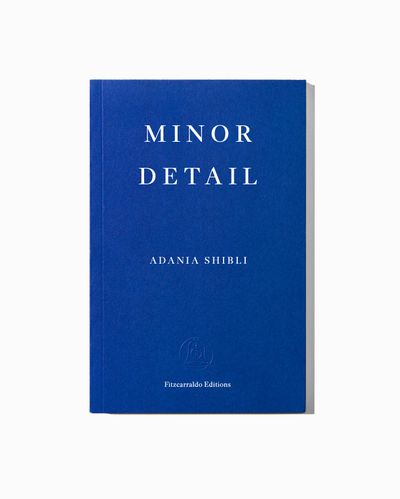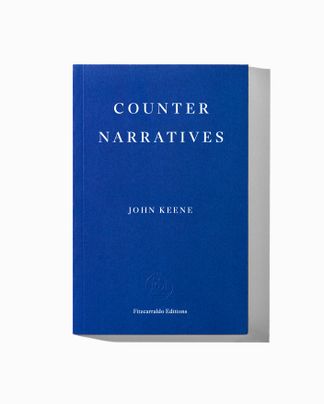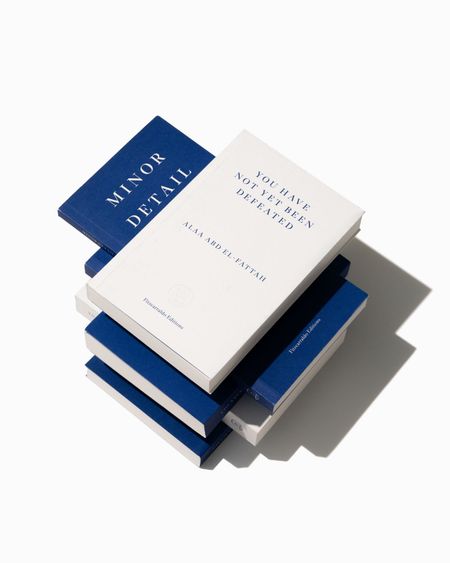Minor Detail begins during the summer of 1949, one year after the war that the Palestinians mourn as the Nakba – the catastrophe that led to the displacement and expulsion of more than 700,000 people – and the Israelis celebrate as the War of Independence. Israeli soldiers capture and rape a young Palestinian woman, and kill and bury her in the sand. Many years later, a woman in Ramallah becomes fascinated to the point of obsession with this ‘minor detail’ of history. A haunting meditation on war, violence and memory, Minor Detail cuts to the heart of the Palestinian experience of dispossession, life under occupation, and the persistent difficulty of piecing together a narrative in the face of ongoing erasure and disempowerment.

Minor Detail
Translated by Elisabeth Jaquette
Published 6 May 2020 | French paperback with flaps, 120 pages | Audiobook read by Siiri Scott
Longlisted for the 2021 International Booker Prize | Shortlisted for the 2020 National Book Award for Translated Literature
Minor Detail
Translated by Elisabeth Jaquette
I.
Nothing moved except the mirage. Vast stretches of barren hills rose in layers up to the sky, trembling silently under the heft of the mirage, while the harsh afternoon sunlight blurred the outlines of the pale yellow ridges. The only details that could be discerned were a faint winding border which aimlessly meandered across these ridges, and the slender shadows of dry, thorny burnet and stones dotting the ground. Aside from these, nothing at all, just a great expanse of the arid Negev desert, over which crouched the intense August heat.
The only signs of life in the area were distant barking and the noise of soldiers working to set up camp. These reached his ears as he gazed through binoculars from his position atop a hill, examining the scene before him. Against the sun’s harsh glare, he carefully followed the course of narrow paths across the sand, occasionally pausing to fix his gaze on a ridge for a moment longer. Finally, he lowered his binoculars, wiped off the sweat and returned them to their case. Then he began making his way through the thick, heavy afternoon air, back to the camp.
When they had arrived, they found two standing huts and the remains of a wall in a partially destroyed third. It was all that had survived in this place after the heavy shelling the area had experienced at the beginning of the war. But now a command tent and mess tent were pitched next to these huts, and the sounds of hammering stakes and clattering poles filled the air as the soldiers worked to pitch the three tents that would serve as their quarters. His deputy, the sergeant major, met him upon his return, and informed him that the men had removed all the rubble and stones from the area, and that a group of soldiers was working to rebuild the trenches. He replied that all preparations must be finished before nightfall, then told him to order the division sergeants and some corporals and experienced soldiers to report for a meeting in the command tent immediately.
*
Afternoon sunlight filled the entrance to the tent, streamed through it and spread across the sand, revealing little indentations on its surface made by the soldiers’ feet. He began the briefing by explaining that their primary mission during their presence here, in addition to demarcating the southern border with Egypt and preventing anyone from penetrating it, was to comb the southwest part of the Negev and cleanse it of any remaining Arabs. Air Force sources had reported movements here, of Arabs and infiltrators in the area. They would also undertake daily reconnaissance patrols, to explore and familiarize themselves with the region. This operation could take some time, but they were to remain stationed here until security in this part of the Negev had been established. They would also run daily drills and military manoeuvres with the soldiers, to train them in desert combat and acclimatize them to the conditions.
The soldiers in attendance listened as they followed the movement of his hands over the map laid out in front of them, where the camp’s position appeared in the form of a small, barely discernible black dot inside a large grey triangle. None of them commented on what was said, and silence filled the tent for several seconds. The officer turned his gaze from the map to their sullen faces, dripping with sweat, glistening in the light that came through the entrance to the tent. After a pause he continued, instructing them to be sure that the soldiers, especially those who had recently joined the platoon, took good care of their uniforms and gear; if anyone lacked clothing or equipment, they should notify him immediately. The soldiers should also be reminded of the importance of maintaining personal hygiene, and shaving daily. Then, before adjourning the meeting, he turned to the driver, a sergeant, and two corporals who were present, and ordered them to prepare to depart with him on a preliminary reconnaissance patrol of the area.
Before the patrol, he stopped by one of the huts, which he had taken as his quarters, and began moving his belongings from the entrance, where he had stacked them, to a corner of the room. Then he took a jerry can from the stack, and poured water from it into a small tin bowl. He took a towel from his kitbag, dipped it in the water he had poured into the bowl and used it to wipe the sweat from his face. He rinsed the towel, then took off his shirt and wiped his armpits. He put his shirt back on, buttoned it up, then rinsed the towel thoroughly and hung it on one of the old nails that remained in the wall. Then he took the bowl outside, poured the dirty water onto the sand, went back into the room, put the bowl in the corner with the rest of his belongings and left.
The driver was sitting in his seat behind the steering wheel, while the rest of the group that had been ordered to join him were standing around the vehicle. As he approached, they climbed in the back, and he took the front passenger seat. The driver adjusted his position before reaching for the ignition switch and starting the engine, which released a loud roar out into the open space.
(…)
‘An extraordinary work of art, Minor Detail is continuously surprising and absorbing: a very rare blend of moral intelligence, political passion and formal virtuosity.’
— Pankaj Mishra, author of The Age of Anger
‘Adania Shibli takes a gamble in entrusting our access to the key event in her novel – the rape and murder of a young Bedouin woman – to two profoundly self-absorbed narrators – an Israeli psychopath and a Palestinian amateur sleuth high on the autism scale – but her method of indirection justifies itself fully as the book reaches its heart-stopping conclusion.’
— J. M. Coetzee, 2003 Nobel Prize-winner
‘Adania Shibli’s exceptional novel Minor Detail belongs to the genre of the novel as resistance, as revolutionary text. As we join the nameless young woman in her quest to find the truth of a long-forgotten atrocity, we realize how dangerous it is to reclaim life and history in the face of ongoing, systematic erasure. The narrative tempo, that eventually reaches a crescendo, astutely captures how alienation and heightened anxiety are elemental states of living under Israeli occupation. This is the political novel we have all been waiting for.’
— Meena Kandasamy, author of When I Hit You
‘Written with an exquisite, tactile, and deceptive simplicity, Minor Detail tells the story of a woman’s violation and murder in the aftermath of the Palestinian catastrophe and the founding of the Israeli state, and of another woman’s curiosity about this “minor detail” in the modern day. Immediately after I finished reading this miraculous novel, I read it again; both times, it sliced through my heart. I believe it will be one for the ages.’
— Isabella Hammad, author of The Parisian
‘All novels are political and Minor Detail, like the best of them, transcends the author’s own identity and geography. Shibli’s writing is subtle and sharply observed.’
— Fatima Bhutto, Guardian
‘A sophisticated, oblique novel about empathy and the urge to right wrongs.’
— Anthony Cummins, Observer
‘Though Minor Detail initially promises to be a kind of counterhistory or whodunit – a rescue of the victim’s story from military courts and Israeli newspapers – it turns out to be something stranger and bleaker. Rather than a discovery of hidden truths, or a search for justice, it is a meditation on the repetitions of history, the past as a recurring trauma…. For Shibli, the emblematic experience of occupation is the longue durée of ennui and isolation rather than the dramatic moment of crisis.’
— Robyn Cresswell, New York Review of Books
‘What links these two stories? Borders, of course, but also some weird echoes. The woman from Ramallah sneaks into Israel to find out more, for there may be “nothing more important than this little detail, if one wants to arrive at the complete truth.” Shibli delicately suggests that the “complete truth” of the crime [in Minor Detail] might never be found out, that perhaps the details in the two stories mirror each other because the past isn’t even past.’
— Abhrajyoti Chakraborty, New York Times
‘Shibli has created a powerful set of dual heroines, women wracked with disquiet and violence, resisting the frames that have first, been chosen for them, then denied to have ever existed. This is an astonishing, major book.’
— John Freeman, Lithub
‘The most talked-about writer on the West Bank.’
— Ahdaf Soueif
‘An intense and penetrating work about the profound impact of living with violence – Shibli’s work is powerful and this translation by Elisabeth Jaquette is rendered with exquisite clarity and quiet control.’
— Katie da Cunha Lewin, Los Angeles Review of Books
‘Shibli writes to both give voice and honor silence; Jaquette does the same, rendering her prose with a sharpness that pulls us along, on edge.’
— Asymptote
‘In Elisabeth Jaquette’s fine translation from Arabic, Shibli asks how we can account for and understand major crimes, by looking more closely for the details that escape.’
— Prospect
‘While Minor Detail is certainly captivating for its spare and powerful style, it is its grappling with such fundamental questions about the production, preservation, and destruction of the past, as well as the ways in which these conditions determine which futures can be imagined, that makes it a work of undeniable political urgency.’
— Stinging Fly
‘In its broad strokes, Minor Detail is a blistering allegory about state violence and the conscription of women’s bodies. In its minor details, it offers a piercing account of everyday life for Palestinians living under Israeli occupation.’
— Saturday Paper
‘Minor Detail has the qualities of a classic: original, distinctive, determined; revealing everything, while dictating nothing.’
— Selma Dabbagh, Electronic Intifada
‘It is brutal, hypnotic and haunting.’
— The Monthly
‘The formal triumph of Minor Detail lies in its circumscribed focus. By honing in on a single incident, breaking it down into its constituent parts, exploring its reverberations through time, Shibli leads the reader to imagine the thousands of such minor details that have been erased from the historical record.’
— The Baffler
‘Minor Detail can be read as the blackest of black comedies, in orbit about tragedy as rings around a dark planet. The abject is the centre of gravity here, and we may only approach so close before words themselves are crushed.’
— Sydney Morning Herald
‘It is a novel of protest, a work of resistance against injustice. Driven forward by a need to uncover the truth, the novel in its two parts moves from sweeping agoraphobia to gripping claustrophobia. It demands empathy but seldom shows it, amplifying the scale of the catastrophe. The tension, the ceaseless and captivating pace of the book over its one-hundred-and-five pages, comes from its refusal to look away. The invisible is made visible. The out-of-focus is rewound and replayed. And the minor details are lost in yellow seas.’
— Joshua Jones, Litro
‘The power of this book is undeniable. The two halves close around you. I am here for whatever Shibli writes.’
— Daisy Johnson, author of Everything Under
Adania Shibli was born in Palestine in 1974. Her first two novels appeared in English with Clockroot Books as Touch (tr. Paula Haydar, 2010) and We Are All Equally Far From Love (tr. Paul Starkey, 2012). She was awarded the Young Writer’s Award by the A. M. Qattan Foundation in 2002 and 2004. Minor Detail was shortlisted for the National Book Award for Translated Literature in 2020, and longlisted for the International Booker Prize in 2021.
Elisabeth Jaquette is an award-winning translator from the Arabic, whose work includes Basma Abdel Aziz’s The Queue, Rania Mamoun’s Thirteen Months of Sunrise, and Dima Wannous’s The Frightened Ones. She is also executive director of the American Literary Translators Association (ALTA).






